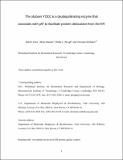The otubain YOD1 is a deubiquitinating enzyme that associates with p97 to facilitate protein dislocation from the ER
Author(s)
Ploegh, Hidde; Mueller, Britta; Schlieker, Christian; Ernst, Robert
DownloadErnst_Otubain.pdf (271.3Kb)
PUBLISHER_POLICY
Publisher Policy
Article is made available in accordance with the publisher's policy and may be subject to US copyright law. Please refer to the publisher's site for terms of use.
Terms of use
Metadata
Show full item recordAbstract
YOD1 is a highly conserved deubiquitinating enzyme of the ovarian tumor (otubain) family, whose function has yet to be assigned in mammalian cells. YOD1 is a constituent of a multiprotein complex with p97 as its nucleus, suggesting a functional link to a pathway responsible for the dislocation of misfolded proteins from the endoplasmic reticulum. Expression of a YOD1 variant deprived of its deubiquitinating activity imposes a halt on the dislocation reaction, as judged by the stabilization of various dislocation substrates. Accordingly, we observe an increase in polyubiquitinated dislocation intermediates in association with p97 in the cytosol. This dominant-negative effect is dependent on the UBX and Zinc finger domains, appended to the N and C terminus of the catalytic otubain core domain, respectively. The assignment of a p97-associated ubiquitin processing function to YOD1 adds to our understanding of p97's role in the dislocation process.
Date issued
2009-10Department
Massachusetts Institute of Technology. Department of Biology; Whitehead Institute for Biomedical ResearchJournal
Molecular Cell
Publisher
Elsevier Inc.
Citation
The Otubain YOD1 Is a Deubiquitinating Enzyme that Associates with p97 to Facilitate Protein Dislocation from the ER Ernst, Robert; Mueller, Britta; Ploegh, Hidde L.; Schlieker, Christian doi:10.1016/j.molcel.2009.09.016 (volume 36 issue 1 pp.28 - 38)
Version: Author's final manuscript
ISSN
1097-2765